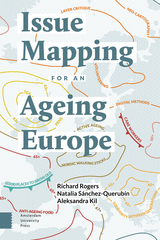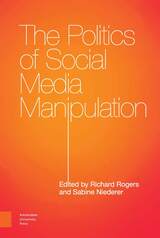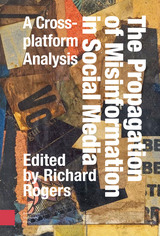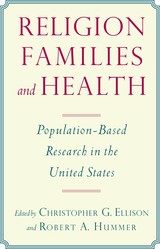4 books about Rogers, Richard

Issue Mapping for an Ageing Europe
Edited by Richard Rogers, Natalia Sánchez-Querubín, and Aleksandra Kil
Amsterdam University Press, 2015
Issue Mapping for an Ageing Europe is a seminal guide to mapping social and political issues with digital methods. The issue at stake concerns the imminent crisis of an ageing Europe and its impact on the contemporary welfare state. The book brings together three leading approaches to issue mapping: Bruno Latour's social cartography, Ulrich Beck's risk cartography and Jeremy Crampton's critical neo-cartography. These modes of inquiry are put into practice with digital methods for mapping the ageing agenda, including debates surrounding so-called 'old age', cultural philosophies of ageing, itinerant care workers, not to mention European anti-ageing cuisine. Issue Mapping for an Ageing Europe addresses an urgent social issue with new media research tools.
[more]

The Politics of Social Media Manipulation
Richard Rogers
Amsterdam University Press, 2020
Disinformation and so-called fake news are contemporary phenomena with rich histories. Disinformation, or the willful introduction of false information for the purposes of causing harm, recalls infamous foreign interference operations in national media systems. Outcries over fake news, or dubious stories with the trappings of news, have coincided with the introduction of new media technologies that disrupt the publication, distribution and consumption of news -- from the so-called rumour-mongering broadsheets centuries ago to the blogosphere recently. Designating a news organization as fake, or der Lügenpresse, has a darker history, associated with authoritarian regimes or populist bombast diminishing the reputation of 'elite media' and the value of inconvenient truths. In a series of empirical studies, using digital methods and data journalism, the authors inquire into the extent to which social media have enabled the penetration of foreign disinformation operations, the widespread publication and spread of dubious content as well as extreme commentators with considerable followings attacking mainstream media as fake.
[more]

The Propagation of Misinformation in Social Media
A Cross-platform Analysis
Richard Rogers
Amsterdam University Press, 2023
There is growing awareness about how social media circulate extreme viewpoints and turn up the temperature of public debate. Posts that exhibit agitation garner disproportionate engagement. Within this clamour, fringe sources and viewpoints are mainstreaming, and mainstream media are marginalized. This book takes up the mainstreaming of the fringe and the marginalization of the mainstream. In a cross-platform analysis of Google Web Search, Facebook, YouTube, Reddit, Twitter, Instagram, 4chan and TikTok, we found that hyperpartisan web operators, alternative influencers and ambivalent commentators are in ascendency. The book can be read as a form of platform criticism. It puts on display the current state of information online, noting how social media platforms have taken on the mantle of accidental authorities, privileging their own on-platform performers and at the same time adjudicating between claims of what is considered acceptable discourse.
[more]

Religion, Families, and Health
Population-Based Research in the United States
Ellison, Christopher G
Rutgers University Press, 2010
Religion is a major social institution in the United States. While the scientific community has experienced a resurgence in the idea that there are important linkages between religion and family life and religion and health outcomes, this area of study is still in its early stages of development, scattered across multiple disciplines, and of uneven quality. To date, no book has featured both reviews of the literature and new empirical findings that define this area for the present and set the agenda for the twenty-first century. Religion, Families, and Health fills this void by bringing together leading social scientists who provide a theoretically rich, methodologically rigorous, and exciting glimpse into a fascinating social institution that continues to be extremely important in the lives of Americans.
[more]
READERS
Browse our collection.
PUBLISHERS
See BiblioVault's publisher services.
STUDENT SERVICES
Files for college accessibility offices.
UChicago Accessibility Resources
home | accessibility | search | about | contact us
BiblioVault ® 2001 - 2024
The University of Chicago Press









